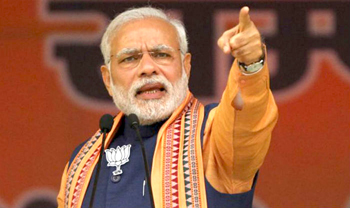Agra, Nov 21: Prime Minister Narendra Modi on Sunday said political leaders behind multi-crore chit fund scams are attacking him as they have been hit hard by demonetisation.
 Modi’s remarks were seen as a sharp attack on West Bengal Chief Minister Mamata Banerjee.
Modi’s remarks were seen as a sharp attack on West Bengal Chief Minister Mamata Banerjee.
The prime minister also hit out at the Congress saying governments in the past 70 years kept quiet on blackmoney because they were worried about losing power.
Addressing a ‘Parivartan rally’ here, Modi cautioned people holding Jan Dhan accounts not to allow themselves to be used for laundering the money of the rich by depositing their ill-gotten wealth as they could unnecessarily get into problems with the law.
“I know what sort of people are raising their voice against me. Does the country not know whose money was invested in chit fund business? Lakhs and crores of poor people invested money in chit funds. But with the blessings of politicians, crores and crores of rupees have vanished,” he said in barbs aimed apparently at Mamata, who had been rallying political leaders against the demonetisation decision. However, the prime minister did not name any leaders.
Veiled attack on Congress
Modi said previous governments did not take any step to check black money as they were worried more about losing power than about the country.
“For how long will the country keep quiet? They (previous governments) kept quiet for 70 years. Not because they were unaware of this disease. They worried less about country and more about power. That’s why they were not ready to take any step (to check it),” the Prime Minister said, in a veiled attack at Congress.
He said fake currency notes were pushed into the country and because of the demonetisation, the business of drugs and other narcotics have come to stand still. “This is a big jolt to the business of fake Indian currency,” the prime minister said.The prime minister said his demonetisation decision had severly hit the parties whose leaders seek money in lieu of tickets for contesting Assembly polls, in a veiled attack on BSP chief Mayawati, who has been facing such charges.
“I know some people have lost everything (because of demonetisation). (if) you have to become MLA, bring so many notes, then you will become an MLA. Notes had been stashed. What will happen to these notes? Whom did these notes belong to? Did these not belong to the poor and honest people? This game should come to an end,” Modi said here in the poll-bound state.





Comments
look at the comments ,it is well understood ... why burnol sales and itch guard sales went up in one particualr community dominatd areas ... hahaha instead of screaming one mullah also came and start commenting hahahaha.... jai sri ram ... we must over throw this jihadist menace and their empire built around with a parallel exconomy must be brutally crushed ... we are with you narendra modiji ... clamp down on all bhagyas ..
When more than 50% people do not have bank accounts and when 85% of the cash is removed from the market, mathematics say that something has to go wrong.
No hope of recovery...... sab kuch khatam hogaya lagta hai
What else we can expect from this Beef Exporter and Slave of Bellary reddy ....
Chor sale andha hai kya ???
Thuje nazar nehi aatha desh me kya horaha hai our ghareeb log kitne mushkil utaarahehain there waje se...
Add new comment